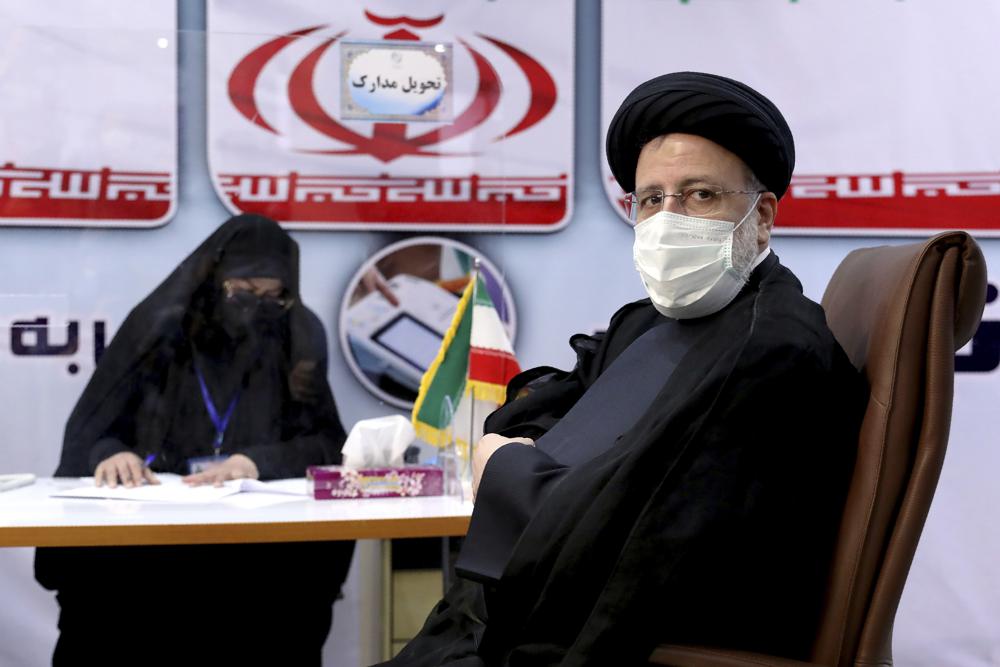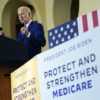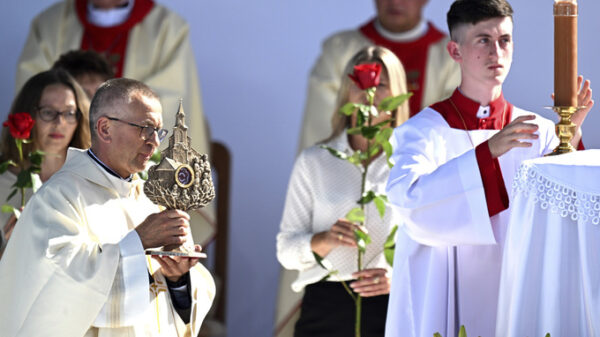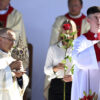Ebrahim Raisi, head of Iran’s judiciary registers his name as a candidate for the June 18 presidential elections at the interior Ministry in Tehran, Iran, Saturday, May 15, 2021. (AP Photo/Ebrahim Noroozi)
DUBAI, United Arab Emirates (AP) — The hard-line cleric in charge of Iran’s judiciary who also took part in a panel involved in the mass execution of thousands of prisoners in 1988 registered Saturday to run for the country’s presidency.
Ebrahim Raisi has been named as a possible successor to Iran’s 82-year-old Supreme Leader Ayatollah Ali Khamenei, leading some to suggest he wouldn’t run in the race. However, his registration shows he still has interest in the office he failed to obtain in 2017.
His close ties to Khamenei and popularity in part from his televised anti-corruption campaign could make him a favorite in an election in which analysts already believe that hard-liners enjoy an edge. A crush of journalists followed Raisi through the Interior Ministry as he registered, the 60-year-old cleric waving to staffers as he passed.
In a statement just before his registration, Raisi promised to fight “poverty and corruption, humiliation and discrimination” if he becomes president. He added his tenure in office would seek to have a “popular administration for a powerful Iran,” a dig at Iran’s current president, the relatively moderate Hassan Rouhani, who has struggled under re-imposed U.S. sanctions after then-President Donald Trump unilaterally withdrew America from the nuclear deal.
Raisi, wearing his black turban that identifies him as a direct descendant of Islam’s Prophet Muhammad, offered fiery remarks to journalists on his campaign. He vowed that if he wins the June 18 vote, corruption will be “dried up.”
“Those who founded and partnered with the current situation can’t claim they can change it,” Raisi said. “People are complaining about the current situation. They are upset. Their disappointment is on the rise. This should be stopped.”
Activists, however, hold a far different view of Raisi over his involvement in the 1988 mass execution of prisoners at the end of Iran’s long war with Iraq. After Iran’s then-Supreme Leader Ruhollah Khomeini accepted a U.N.-brokered cease-fire, members of the Iranian opposition group Mujahedeen-e-Khalq, heavily armed by Saddam Hussein, stormed across the Iranian border in a surprise attack.
Iran ultimately blunted their assault, but the attack set the stage for the sham retrials of political prisoners, militants and others that would become known as “death commissions.” Some who appeared were asked to identify themselves. Those who responded “mujahedeen” were sent to their deaths, while others were questioned about their willingness to “clear minefields for the army of the Islamic Republic,” according to a 1990 Amnesty International report.
International rights groups estimate that as many as 5,000 people were executed, while the Mujahedeen-e-Khalq puts the number at 30,000. Iran has never fully acknowledged the executions, apparently carried out on Khomeini’s orders, though some argue that other top officials were effectively in charge in the months before his 1989 death. Raisi reportedly served on a panel involved in sentencing the prisoners to death.
Raisi has never publicly acknowledged his role in the executions, even while campaigning for president in 2017. He ultimately lost to Rouhani, though he still garnered nearly 16 million votes in his campaign. Khamenei appointed him as head of the judiciary in 2019, signaling he still had hopes for Raisi’s political career.
In 2016, Khamenei appointed Raisi to run the Imam Reza charity foundation, which manages a vast conglomerate of businesses and endowments in Iran. It is one of many bonyads, or charitable foundations, fueled by donations or assets seized after Iran’s 1979 Islamic Revolution.
These foundations offer no public accounting of their spending and answer only to Iran’s supreme leader. The Imam Reza charity, known as “Astan-e Quds-e Razavi” in Farsi, is believed to be one of the biggest in the country. Analysts estimate its worth at tens of billions of dollars as it owns almost half the land in Mashhad, Iran’s second-largest city.
Analysts have speculated that Khamenei could be grooming Raisi as a possible candidate to be Iran’s third-ever supreme leader, a Shiite cleric who has final say on all state matters and serves as the country’s commander-in-chief.
Within Iran, candidates exist on a political spectrum that broadly includes hard-liners who want to expand Iran’s nuclear program, moderates who hold onto the status quo, and reformists who want to change the theocracy from within.
Those calling for radical change find themselves blocked from even running for office by the Guardian Council, a 12-member panel that vets and approves candidates under Khamenei’s watch.
Other candidates who registered Saturday include Ali Larijani, a prominent conservative voice and former parliament speaker who later allied himself with Rouhani.
At the same time Larijani registered, so too did Mohsen Hashemi Rafsanjani, the eldest son of the late former Iranian President Akbar Hashemi Rafsanjani. Rafsanjani, a member of Tehran’s city council, has been described as a reformist by political commentators.
Rouhani’s senior Vice President Eshaq Jahangiri, also registered Saturday, just days after authorities detained his brother to serve a two-year prison sentence over fraud and foreign currency smuggling charges.
Several other candidates have prominent backgrounds in the Guard, a paramilitary force answerable only to Khamenei. Hard-liners have increasingly suggested a former military commander should be president given the country’s problems, something that hasn’t happened since Iran’s 1979 Islamic Revolution and the purge of the armed forces that followed.
Iran’s former hard-line President Mahmoud Ahmadinejad also registered Wednesday. Though his attempt to run in 2017 ultimately was blocked after Khamenei criticized Ahmadinejad, this year the supreme leader has not warned him off.
The Guardian Council will announce a final list of candidates by May 27, and a 20-day campaign season begins the following day.
Associated Press writer Nasser Karimi in Tehran, Iran, contributed to this report.
Copyright 2020 Associated Press. All rights reserved.



























